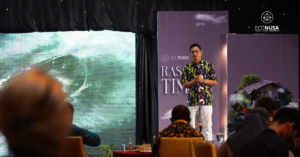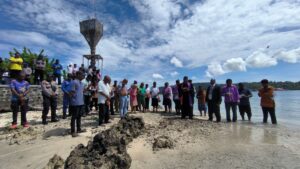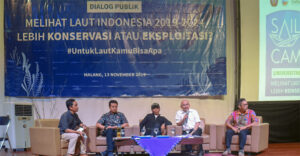
A signage read “Rarama Bebye Ro Rumfarkor Ine” on a wooden mossy gate welcome EcoNusa team upon entering YPK Getsemani elementary school compound. The saying comes from Biak Betew language which means “You who come to this school”.
YPK Getsemani is the only school in Saporken Village, South Waigeo District, Raja Ampat Regency in West Papua. The school has 90 students and 10 teachers. There are six classes in the compound with two buildings here.
According to Darius Ap., a teacher of YPK Getsemani elementary school, teaching and learning activity has changed since the Covid-19 pandemic. Despite the green zone category, the school activities should comply with Covid-19 health protocol. It applies shift schedule. For instance, when grade, 1st, 3rd, and 5th go to school this day, then the next day will be the 2nd, 4th and 6th grades’ turn. Each class is divided into two groups for a social distancing.

“The pupils here get used to the Covid-19 condition. They are aware (of Covid-19) as we frequently inform them. But (pandemic) is no longer terrifying issue to them,” said Darius.
From education viewpoint, there is less change seen at Saporken Village. But, it would be a different issue when it talks about the condition of birdwatching tourism in the village.
Saporkren forest is reputable with habitat of five endemic bird species of Waigeo Island. Those are tree cendrawasih or red bird of paradise, Wilson cendrawasih, Raja Ampat pitohui, brown hooded crow and spice imperial pigeon. All of them live freely as they sometimes fly through the village. The fascination of birdwatching at Saporkren has increased the occupancy of homestay at the village. With the daybreak time for birdwatching, birdwatch enthusiasts prefer to stay at homestay which is located nearby Saporkren forest than at faraway location. But, it was far before the pandemic.
Sony Rumbino, one of participants on agriculture counseling and tour guide, said that there has been no more guest visiting Saporkren for birdwatching since February. Pandemic has changed routine living of Sony and other locals. Such a condition is deemed anomalous. It has been from 2004 when Sony and some of the villagers started guiding domestic and international tourists to watch bird in Saporkren. But, such a situation happens now.
It surely gives significant impact to the economic life of Saporkren community who depends their livelihood on tourism. Sony responds the abnormal situation by clearing land and doing farming since May. He should do something to survive his wife and four children.
Sony took EcoNusa team to the forest to see his garden. It is not far from his residence. It just takes 10-minute walk through a small path from the last house. The path has wet and slippery soil. But, Sony walked through it swiftly despite his barefoot while bringing with him a Canon DSLR camera given by the Ministry of Environment and Forest. With the camera, he could portray fauna as part of his jobs as a birdwatching tour guide.

He used to play at the forests. Sony has actively engaged with local forest farmers group that safeguard the 2,000 hectares of Saporkren areas. They often caught illegal hunters for entering the forest to shoot bird. His feet are resistant to the road with karst limestone. He walks in agile footwork. He was unlike EcoNusa team who should struggle hard to maintain balance from slippery track.
After passing by bush and collided trees, EcoNusa team arrived at Sony’s land. The 50 x 60 meters plot of land have cassava, potato, betel and corn he could easily find the seeds from the forest. To prevent from wild boar, Sony made one-meter height wooden fence surrounding his garden. He is now preparing other seeds while waiting for the first harvest time.
“The main constraint in farming is about the initial capital to fund the equipment and seeding materials and land cultivation,” he said sharing the challenges faced by him and other villagers to start farming.
Now, Sony got additional knowledge from EcoNusa Covid-19 Response team that provided counseling on food security. With the given agriculture equipment, Sony and other Saporkren residents who are fighting to survive from pandemic have been resolved.
Editor: Leo Wahyudi & V.Arnila Wulandani







